June 1, 2025 | 15:37 GMT +7
June 1, 2025 | 15:37 GMT +7
Hotline: 0913.378.918
June 1, 2025 | 15:37 GMT +7
Hotline: 0913.378.918
The faint scent of essential oil spreading all over the room gently guided me to a state of calmness and quickly put us to sleep. And then came the morning sunrise, we could hear some vibrant noise outside the window. Some men were standing on a boat with hands holding onto a cable, making their way to “the company”.
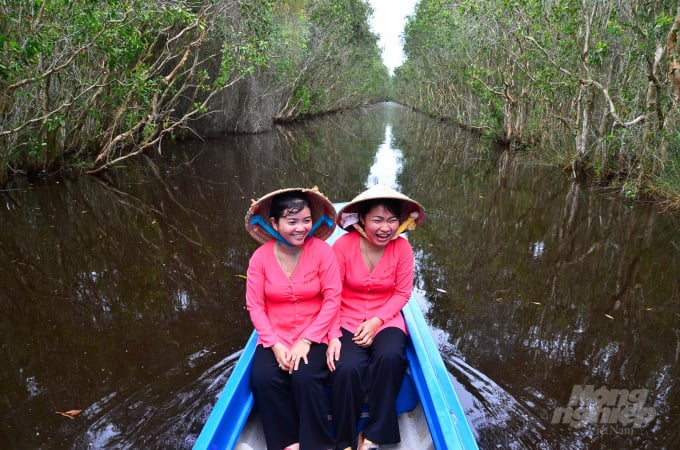
Boat ride experience in the middle of the melaleuca forest. Photo: Duong Dinh Tuong.
“Black Hung” was also among the crew. “This place was full of leaf houses at that time. People had to drink water mixed with alum. There was no road, only canals. To get to the market, you had to go by small boat. Mosquitoes were everywhere, and their disturbing noises were all around our ears. We had to hang a curtain just to eat our meal in peace. It was ‘Ba Alum Soil’ who helped us by buying each of us a canoe to go and cut leaves to cook melaleuca essential oil."
His words made us curious about this “Ba Alum Soil” character. We decided to dig deeper into the story of an age called “Moc Hoa Melaleuca Oil Enterprise” - the precursor of Dong Thap Muoi Pharmaceutical Research and Development Joint Stock Company (Medyphica) in Binh Phong Thanh, Moc Hoa district, Long An province, later led by Pharmacist Nguyen Van Be. Calling it an “enterprise”, but it actually only had three people.
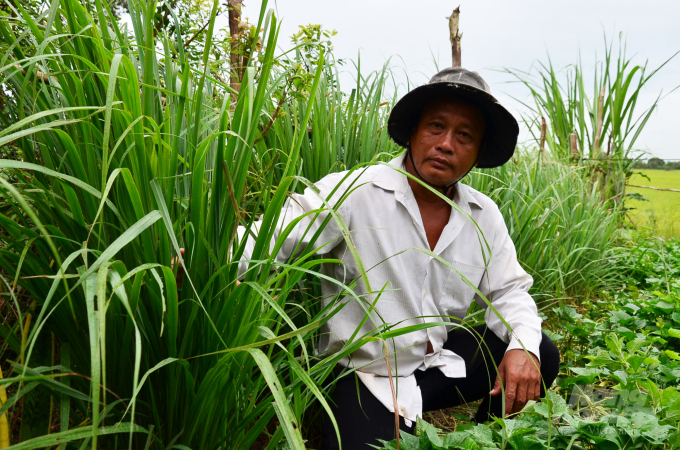
Grow lemongrass for essential oil making. Photo: Duong Dinh Tuong.
In his diary, Pharmacist Nguyen Van Be wrote, “We came to this wasteland on January 20, 1984. Our group consisted of three comrades in the Board of Directors of the enterprise, and our property was this wasteland. All people who came to live and work in this land considered labor a legitimate right. That was why we had steeled ourselves to endure all the trials of nature. We forced this wasteland to wake up and contribute valuable products to society along with us humans."
“The director also walked barefoot and work in the alum soil, so the people called him ‘Ba Alum Soil’. He asked 246 households (most of which were from Ben Tre) to come here and divided the land to build houses, harboring in mind a noble act of protecting the border and the melaleuca forest. Most of the people were illiterate, unable to ride bicycles or motorbikes. Some rich ones had motorboats, and the average or poor people have a "Nam Quang canoe", which is made of waste trees. The enterprise was the largest unit in the region back then. It had generators and plowing machines ready to support people to dig dirt and open the land. But later, rice production suffered a constant loss. Most of the 246 households returned to their hometown, only over 20 households chose to stay…”
In the years 1989 - 1990, the Soviet Union was in crisis, and the enterprise lost the export market. It took a while for it to rise once again and transformed into Dong Thap Muoi Pharmaceutical Research and Development Joint Stock Company. Pharmacist Nguyen Van Be was awarded a Hero of Labor medal, but unfortunately in 2016 he suffered a stroke and passed away, unable to see Moc Hoa Melaleuca Oil Enterprise complete the qualification for GMP-WHO standard in 2017…
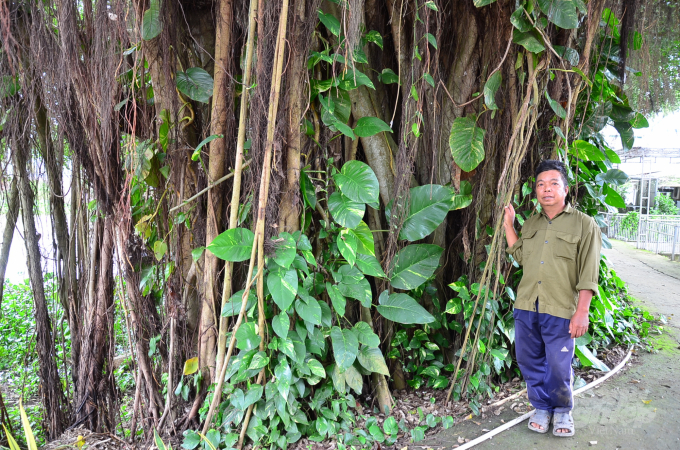
The tree "Black Hung" planted when he first joined “the company” is now this big. Photo: Duong Dinh Tuong.
Director Bui Dac Thang said when he was a student at the University of Medicine and Pharmacy in 1990, he was sent here for an internship and saw that most of the adults were illiterate. After the GMP - WHO factory was built in the poorest and most difficult areas of the province, many experts came, lived here and spread the light of civilization to the people.
About 70 - 80% of the company's workers had a family of two generations. At first, the company opened a school to generalize primary school level for the parents, then the children were next. For anyone who passes university, whether children of workers in the company or farmers outside, the unit would give a reward of VND 5 million.
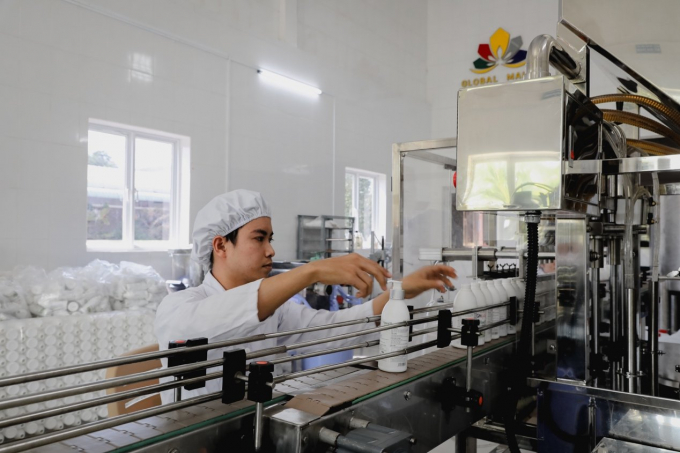
The company's oil and medicine production line.
Director Thang said, "Most of the people around my age let their children leave school early because ‘He's so bad at studying, let him go out to find a job’. I said that if you didn't study well, you have to try hard, at least until the 12th grade. If you didn’t have the resources, the company would provide them. We had to ‘lure’ them step by step like that. After finishing 12th grade, we continue to "lure" them to continue studying for an intermediate-level pharmacist degree, college, and then university. Like Hau, Bang, and Han all became intermediate-level pharmacists, now studying at college. They study online on weekdays, and on Saturday and Sunday they travel nearly 70 km to the city for direct classes.
“Most of the children in the locality only finished 9th or 10th grade, but later stopped. Despite the encouragement and offers to provide money, they still refused and went back to work. But in the case of a few children once stuck their feet in alum soil, thanks to studying hard, they returned, clinging tight to the melaleuca forest.”
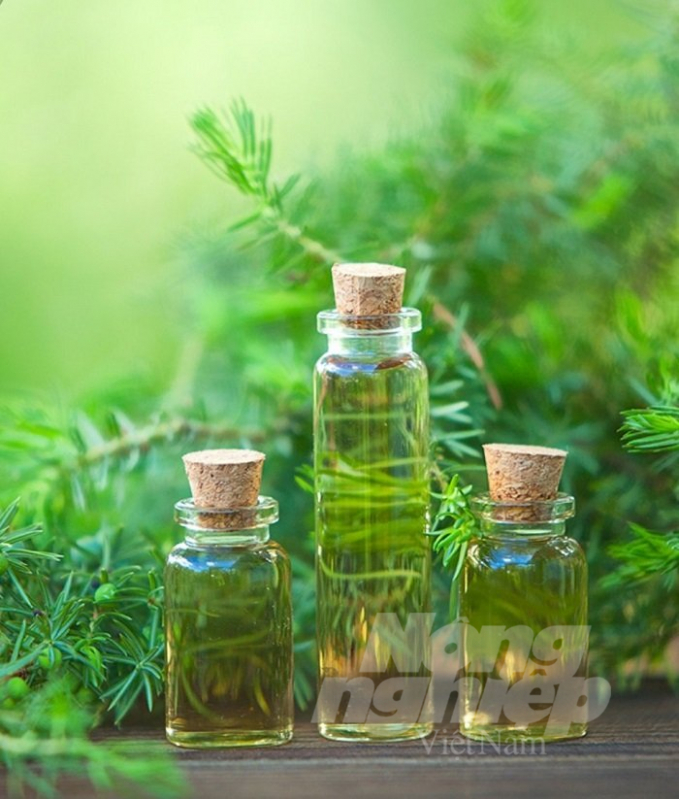
Bottles of pure essential oils.
The company currently has 28 contracted workers having an average income of over VND 6 million/month. The rest are over 30 farmers working part-time. Sometimes they would work on the paddy fields, other time they would make essential oils, do fishing, or work as tour guides.
Although it just went into production at the end of 2017, Medyphica has so far launched more than 30 lines of completely natural products. The workers pick the leaves of melaleuca and other herbs and cut off the branches to extract the transparent, high-class essential oil, completely without solvents. It is so pure that it can become a product which price rivals French perfume.
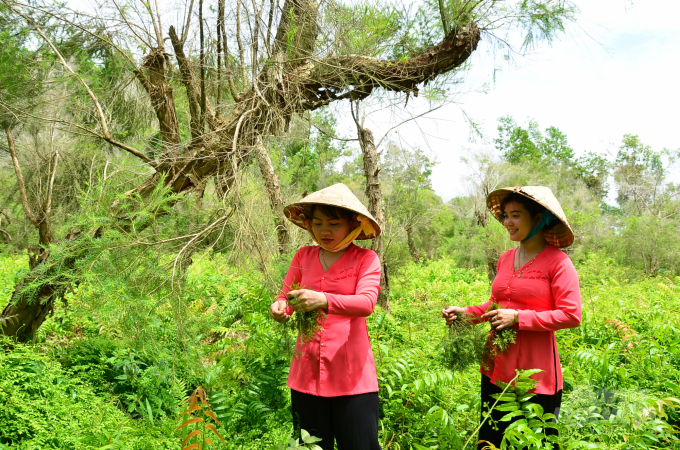
Collecting narrow-leaved paperbark to cook essential oil. Photo: Duong Dinh Tuong.
For example, the essential oil of white weed can cost up to VND 60 million/l, ginger essential oil costs more than VND 40 million/l, turmeric oil costs VND 35 million/liter. The price of essential oil of lemongrass and narrow-leaved paperbark (Melaleuca alternifolia) ranges around VND 7 - 8 million/l, and the price of broad-leaved paperbark (Melaleuca quinquenervia) essential oil is more than VND 2 million/l. The reason they are so expensive is that it takes 500-600 kg of raw materials to produce 1 l of essential oil. These plants are all precious medicinal herbs that both treat visible and invisible wounds which is the human soul in modern times.
Translated by Samuel Pham

(VAN) Several scientists and farmers are experimenting with soil treatment in some key durian-growing regions such as Cai Lay (Tien Giang), Dak Song, Gia Nghia, and Dak R’lap (Dak Nong).
/2025/05/25/4127-3-073637_820.jpg)
(VAN) Thanks to the promotion from an FAO-implemented project, vegetable production in greenhouses in Moc Chau has seen strong development, from 1.5 hectares in 2021 to nearly 50 hectares in 2024.

(VAN) FAO has recently supported USD 140,000 to implement the project 'Risk mitigation human-animal interface risks through disease control initiatives in pig farming.'

(VAN) The People's Committee of Tra Vinh province has approved an adjustment to the investment policy for the Green Hydrogen Plant project, increasing its area to approximately 52.76 hectares.
![Reducing emissions from rice fields: [2] Farmers’ commitment to the soil](https://t.ex-cdn.com/nongnghiepmoitruong.vn/608w/files/news/2025/05/05/dsc08881jpg-nongnghiep-140632.jpg)
(VAN) Clean rice cultivation model in Thuong Tan commune, Bac Tan Uyen district, is assisting local residents in achieving sustainable agriculture by substantially reducing costs, increasing productivity, and protecting the environment.

(VAN) At the conference to disseminate Resolution No. 68, AgriS introduced its digital agricultural ecosystem and reaffirmed its commitment to accompanying the Government in promoting private sector development and sustainable agriculture.

(VAN) 'Blue Ocean - Blue Foods' initiative is designed to restore marine ecosystems and establish sustainable livelihoods for local communities by cultivating a minimum of 1,000 hectares of cottonii seaweed in the first three years.